FYI: For those who follow the {Friday Series}, I’m changing it up a bit! Instead of {Friday Series}, it will not be called {Tips & Tricks}. I thought the new name was more fitting, especially with the material that is covered in these posts. I hope you like the name change! Oh, and don’t worry…I will still post them on Fridays!
Now, onto the post…
With summer right around the corner, I’m sure many of you have already begun your spring cleaning rituals. Dusting, vacuuming, organizing, mopping and tossing unused or old items make up a small part of the spring cleaning “to do” list.
What about those kitchen cupboards? What lurks behind those doors? When was the last time you cleaned out and tossed any old baking ingredients?
I know…this can be scary territory for some of you. However, if properly maintained and stored, your baking ingredients will be your best friends when it comes to preparing tasty treats for family and friends. It is important to make sure these ingredients not only remain fresh to make food taste great, but also so that they don’t become hazardous to your health.
The following are storage tips to consider when cleaning and organizing your baker’s pantry. They are based on food stored at a room temperature of about 70 degrees F. These are simply suggestions…often products have labels that contain important storage information and recommended “use by” dates.
Storing Baking Ingredients
Baking Powder
- Expiration: 12 to 18 months or expiration date on container
- Storage: Store tightly covered in a dry place.
- Test: Mix 1 teaspoon baking powder with 1/3 cup hot water. If it foams vigorously, it still has rising power.
Baking Soda
- Expiration: 12 to 18 months or expiration date on container
- Storage: Store tightly covered in a dry place.
- Test: Place 1 1/2 teaspoons in a small bowl. Add 1 tablespoon vinegar. If it fizzes, then it will still help leaven food. If it doesn’t fizz, use it as an odor catcher in the refrigerator.
Cornmeal
- Expiration: 12 months
- Storage: Store in a cool, dry place. Once opened, store in the refrigerator.
- Test: The smell test will work since cornmeal has a tendency to go rancid since it’s made of corn which has oil in it that will go bad over time.
Cornstarch
- Expiration: 12 to 18 months
- Storage: Store in a dry, airtight container in a cool, dry place.
- Test: If the cornstarch get damp or solidifies, it can be subject to bacterial growth. If dampness or solidification occurs, dispose of it.
Flour
- White All-Purpose Flour
- Expiration: 6 to 12 months
- Storage: Store in an airtight container (or freezer bag) in a cool, dry place.
- Test: Flour has a tendency to develop a rancid smell over time so the smell tests will help when testing flour.
- Whole Wheat Flour
- Expiration: 1 to 3 months (refrigerate if you want to keep it longer)
- Storage: Store in an airtight container in a cool, dry place. For longer storage, store in an airtight container or freezer bag in the refrigerator. It should be good for about 6 months if stored in the refrigerator and 12 months if stored in a freezer. If the flour is refrigerated or frozen, allow it to come to room temperature before using it in baked goods.
- Test: Flour has a tendency to develop a rancid smell over time so the smell tests will help when testing flour.
Honey
- Expiration: 12 months
- Storage: Store in a closed container at room temperature.
- Test: Honey does not spoil but it does have a tendency to crystallize. If this happens, warm it so that it transforms into liquid.
Shortening
- Expiration: 3 to 8 months opened; 8 to 12 months unopened
- Storage: Store in a tightly closed container in a cool, dark place.
- Test: Shortening that has been stored for too long can develop an undesirable taste and odor. If the shortening has not been used in a while, smell it before using.
Spices and Herbs
- Expiration: 1 year for dried herbs or ground spices; 2 years for whole spices
- Storage: Store in a tightly covered container in a dark place away from light, sunlight, heat and moisture (avoid storage near a stove, dishwasher, microwave, refrigerator, sink or heating vent).
- Test: Get in the habit of smelling your spices and herbs periodically to check if the aroma is still immediate and strong. If there is no smell or the smell is off, dispose of the spice or herb.
Sugar
- Brown Sugar
- Expiration: 4 to 6 months (recommended even though it does not spoil)
- Storage: Store brown sugar in an airtight container to retain its moisture. If moisture is lost, brown sugar has a tendency to become very hard. If the brown sugar does become hard, soften it by heating it in a 250 degree oven for a few minutes. Or, another method of softening brown sugar is to place it in a microwave-safe container and cover loosely with a damp, white paper towel. Microwave on high and check every 30 seconds until the brown sugar becomes soft.
- Test: Sugar does not have an expiration date. Discard if the sugar picks up orders or develops lumps.
- Confectioner’s/Powdered/Icing Sugar
- Expiration: 12 to 18 months (recommended even though it does not spoil)
- Storage: Store in an airtight container and place in a cool, dry place (not the refrigerator).
- Test: Sugar does not have an expiration date. Discard if the sugar picks up orders or develops lumps.
- White Granulated Sugar
- Expiration: 2 years (recommended even though it does not spoil)
- Storage: Store in an airtight container in a cool, dry place.
- Test: Sugar does not have an expiration date. Discard if the sugar picks up orders or develops lumps.
Vanilla
- Expiration: 1 year opened, 5 years unopened (recommended even though it does not spoil)
- Storage: Store in an airtight container in a cool, dry place.
- Test: Vanilla will not spoil and, instead, will mature over time due to the alcohol content.
Vegetable Oil
- Expiration: 1 to 6 months opened, 6 to 12 months unopened
- Storage: Store in an airtight container in a cool, dark place.
- Test: Oil that has been stored too long will go rancid and develop an undesirable taste and color. Smell the oil before using it in a recipe.
Vinegar
- Expiration: 1 year opened, 2 years unopened
- Storage: Store in an airtight container in a cool, dark place.
- Test: Vinegar has a tendency to get cloudy over time. Surprisingly, when this does happen, the vinegar is not spoiled and can still be use. Vinegar is self-preserving and the haze that forms is only an aesthetic change.
Yeast (dry packets)
- Expiration: Use-by date
- Storage: Store in the refrigerator once opened and use by use-by date.
- Test: Fill a measuring cup with 1/2 cup of warm water (110-115 degrees F). Stir in 1 teaspoon sugar and two teaspoons yeast (three layers will form: sugar and yeast, cloudy water and film of yeast). If the mixture foams and bubbles within 10 minutes, then the yeast is still active.
While going through your pantry, you might be unsure if something has gone bad. If this happens, I would suggest that you refer to a little saying my Dad taught me…”when in doubt, throw it out.” Try using this saying the next time you’re unsure…I hope it works!
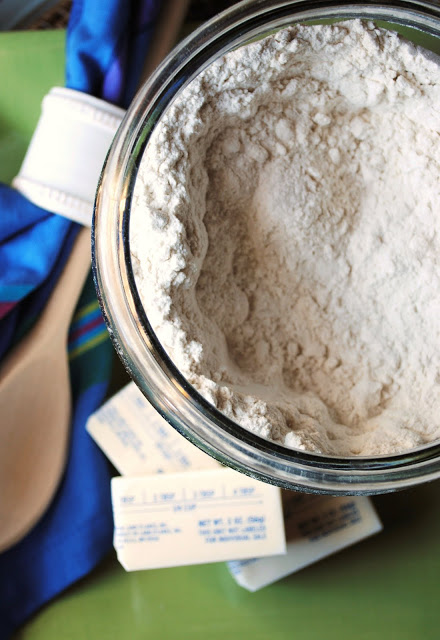
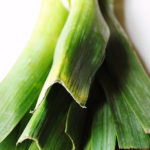
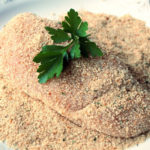

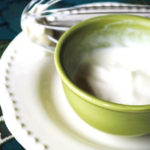
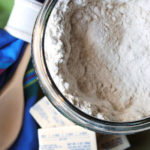

Great post and I LOVE the bigger picture!
Fantastic information as usual, Jen!
Love this!
Love all of these tips! Thanks!
This is a really helpful post. I definitely have some spring cleaning to do in my pantry.
I'm a bit embarrassed to admit I never knew flour's expiration period was between six to twelves months. I usually just smell it to make sure it hasn't gone rancid.
Thanks for this wonderful post. I'll be sure to print it out and keep it around the kitchen :)
Great post and very useful information.
Great reminders and tips!
I was wondering if you have any thoughts on storing honey or agave nectar. I know it's not exactly "baking ingredients," but they've recently become targets for ants in my basement apartment.
Nikki: Honey and agave both have a very sweet smell. This sweet smell has a tendency to attract ants and cause an infestation. It is very important that the containers are kept tightly sealed in either a pantry or on your counter. Also, after using and before storing, be sure to wipe the container clean with a wet cloth to remove any spilled honey or agave.